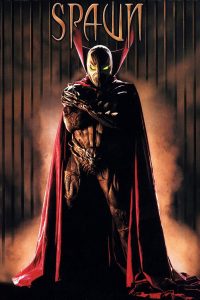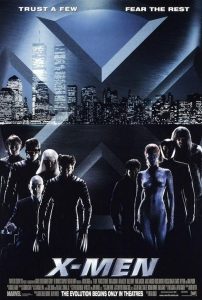PART 4 OF A 4 PART SERIES–Click here for -> Part 1, here for-> Part 2, and here for -> Part 3
A few months after the over-fluffed fourth Batman hit theaters, another superhero movie came out.  Spawn was a relatively newer comic-book, though was very popular. The movie adaptation received fairly low critique. Special effects ranged from decent to dreadful. Scenes where Spawn goes into hell were painful to watch, even back in the 90s. Yet, the movie made modest profits and went to show that people were still interested in mature takes on superheroes, (unlike crappy Steel, starring Shaq and released weeks after Spawn). I personally was not a fan of Spawn comics, but as a teenager interested in superheroes, this movie was a godsend. The Spawn movie remained too obscure to start a Hollywood superhero revolution, but it did help with the cause. Plus, the foundations of things to come had already begun.
Spawn was a relatively newer comic-book, though was very popular. The movie adaptation received fairly low critique. Special effects ranged from decent to dreadful. Scenes where Spawn goes into hell were painful to watch, even back in the 90s. Yet, the movie made modest profits and went to show that people were still interested in mature takes on superheroes, (unlike crappy Steel, starring Shaq and released weeks after Spawn). I personally was not a fan of Spawn comics, but as a teenager interested in superheroes, this movie was a godsend. The Spawn movie remained too obscure to start a Hollywood superhero revolution, but it did help with the cause. Plus, the foundations of things to come had already begun.
After Howard the Duck, regarding their movie ambitions, Marvel Comics didn’t crawl into a corner and weep. The company kept exploring avenues to license movies. In the 80s, there were made for TV movies based off the old Hulk TV series. The Punisher got licensed to an Australian movie studio. In 1989, this Punisher movie released in international markets, but for strange legal reasons didn’t get a US release until 1992, and only then, direct to video. A similar fate burdened a low-budget Captain America movie, which sat in limbo until 1992 also. These movies didn’t seem to surface until mid-way through the 90s when video rental stores and cable channels finally picked them up. Even then they were fairly rare. Both movies have poor reviews nowadays, but back in the 90s they were watchable.
 A bigger debacle burdened the Fantastic Four. A movie was filmed, with release planned for the mid-90s. The story goes that this movie was made cheaply just so a production company could retain movie rights on the characters. Because the movie was absolutely horrible, Marvel apparently bought all distribution rights out of fear their brand might get cheapened. They tried to destroy every copy, but like that Stars Wars Holiday special, sometimes awful things just need to be shared. Marvel also had a few made for TV movies in the late 90s. One was Nick Fury, starring David Hasselhoff. Yeah, most people never heard of this one, or wanted to. Nor did many see Generation-X, a movie spinoff/knock-off of X-Men comics.
A bigger debacle burdened the Fantastic Four. A movie was filmed, with release planned for the mid-90s. The story goes that this movie was made cheaply just so a production company could retain movie rights on the characters. Because the movie was absolutely horrible, Marvel apparently bought all distribution rights out of fear their brand might get cheapened. They tried to destroy every copy, but like that Stars Wars Holiday special, sometimes awful things just need to be shared. Marvel also had a few made for TV movies in the late 90s. One was Nick Fury, starring David Hasselhoff. Yeah, most people never heard of this one, or wanted to. Nor did many see Generation-X, a movie spinoff/knock-off of X-Men comics.
 Marvel seemed in search of a movie that could open a broader door of representation for their many characters. They finally found a safe bet with an obscure character, and a combination of two other popular 90’s trends. Vampire movies found resurrected popularity around this time, and martial arts movies were also kicking around Hollywood. Mix both these things with a comic book character and in 1998, the world got Blade.
Marvel seemed in search of a movie that could open a broader door of representation for their many characters. They finally found a safe bet with an obscure character, and a combination of two other popular 90’s trends. Vampire movies found resurrected popularity around this time, and martial arts movies were also kicking around Hollywood. Mix both these things with a comic book character and in 1998, the world got Blade.
Blade looked like a mainstream action movie, and most audiences seemed to regard it as that. End credits barely mentioned Marvel. The financial success and positive reviews though, encouraged Hollywood production companies to seek rights to other Marvel characters.
In the last few years of the 90s, mainstream movies like Men in Black and The Matrix suggested people wanted to suspend disbelief and accept extraordinary worlds. Some small budget superhero movies slipped between the cracks during this time, and there was one more movie that posed a potential hurdle.
 At a moment when people finally seemed interested in serious superheroes, an old threat—the parody—re-emerged. Mystery Men came out in 1999. If successful, the movie might have set another trend of following the ’66 Batman approach. Although Mystery Men seems to have gained mild favor later on, it initially bombed. This either meant people didn’t care about superheroes, or they wanted something aside from parodies. The answer came a year later.
At a moment when people finally seemed interested in serious superheroes, an old threat—the parody—re-emerged. Mystery Men came out in 1999. If successful, the movie might have set another trend of following the ’66 Batman approach. Although Mystery Men seems to have gained mild favor later on, it initially bombed. This either meant people didn’t care about superheroes, or they wanted something aside from parodies. The answer came a year later.
X-Men was a big summer movie, hyped up and receiving positive reviews. The movie did something similar to Superman in ’78, and Batman in ’89; X-Men garnered broad appeal. Acting was good. Special effects had reached a point where superpowers didn’t cripple the budget. The angle approached toward X-Men certainly had a Hollywood influence. For example, the team wore black leather rather embracing traditional uniforms. Some character’s powers and fighting ability seemed diluted, probably for a believability factor. Even so, I’d credit X-Men as the spark that started the modern superhero movie revolution. But, there were a few other pivotal movies for fueling this flame.
Unbreakable also came out in 2000. The M. Night Shyamalan movie took about as serious an approach to superheroes as possible. Of course, part of the movie’s appeal was the director and cast. Further superhero movies went into development and came out to sometimes mild response after 2000. Then in spring of ‘02, Spider-Man finally got a live-action theatrical release. The movie embraced comic book roots even more than X-Men. Just look at Spidey’s suit; it’s his signature comic book costume. If the X-Men opened the door, then Spider-Man knocked the whole door of its hinges. The movie set critical and financial standards other Hollywood producers could not ignore. From there, superhero movies just kept adding up, with successful launches of newer characters, reboots of old ones, and what essentially became its own genre of movies.
Hollywood still stumbled with superheroes. There have been some awful representations of characters, like Ang Lee’s Hulk. Hollywood also churns out crap for the sake of a few quick bucks, like Catwoman. There have been copycat superhero movies, parodies, and low-budget originals. There’s been some oversaturation of reboots and alternating timeline/realities (mainly X-Men) since production companies can maintain their movie rights by doing this. For the most part though, comic book heroes are still usually represented fairly well in modern movies.
Something comic book fans could have told Hollywood long before 2000, even before ’89 or ’78, was that comic-book superheroes have immensely rich histories. Comic-books have great diversity and variety in characters and settings. There are whole worlds of amazing lore and myth within comics. This is why people love comic-books, and this is part of the appeal of superhero movies. Even though there are so many good options for superhero movies today, some of those older movies which helped pave the way: Superman IV, Howard the Duck, The Phantom, well, these still really kind of suck, but they do have some charm to them. Looking at older movies, thinking of the many people who fought long hard battles to transform drawings on newsprint into images on the big-screen, any comic book fan can surely appreciate the long struggle in Hollywood that led to people looking up at a screen and at least for the duration of a movie, truly believing in superheroes.